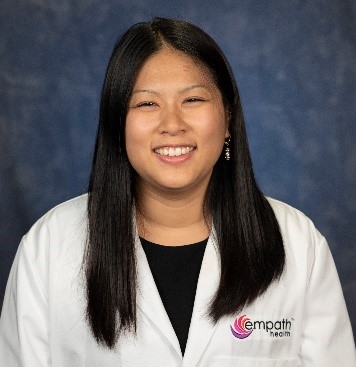Carol Li, D.O., recently became medical director for Suncoast Hospice, a member of Empath Health. A hospice and palliative board-certified physician, she first joined Suncoast Hospice in 2018, caring for patients in an inpatient care center.
Li received her Doctor of Osteopathic Medicine from Rowan University School of Osteopathic Medicine in New Jersey and completed her residency in internal medicine at Largo Medical Center.
Suncoast’s parent company, Empath Health is set to merge with Stratum Health, which operates Tidewell Hospice with an integration date of January 2023. Their aim is to create a hospice-based integrated care network providing care in the home and community.
Li spoke with Hospice News about the challenges and opportunities of leading a medical staff during a pandemic.
Congratulations on your new role as medical director. Could speak a little bit about your prior professional background?
I was interested in lots of areas of medicine, but nothing really called to me like hospice did. While I was in my internal medicine residency training, I started to become drawn to helping patients and families navigate the difficult terrain regarding end-of-life decisions.
I wanted to explore that further, so I decided to create an externship during my residency, so I could be fully immersed. The interdisciplinary approach to patient-centered care really ended up resonating with my training as an osteopathic physician. I think more importantly, I wanted the opportunity to have a meaningful impact on patients and families during their most difficult times. So I pursued a hospice and palliative medicine fellowship at [the [University of South Florida].
Because of my previous observations with Suncoast Hospice surrounding their collaborative environment and the compassionate care that they were providing, I decided to return.
As you move into this new role, what do you see as your top priorities?
What I really love about Suncoast Hospice is the community we’ve built here. As medical director, I want to focus on maintaining that culture and improving upon the things that we do well. I want to create stabilization in the face of expansion. We are growing the number of patients and families we’re serving and, of course, increasing our footprint with the oncoming merger between Empath Health and Stratum Health.
Currently, one of the big projects that we’re working on right now is implementing a new [electronic medical record system]. Replacing the existing system is an investment of time and resources, because it’s an iterative process of customizing and modifying and testing. Ultimately its success, the implementation of this new model will mean that we’ll be able to standardize and simplify our organizational processes, and in turn improve workplace efficiency. This new software is designed to facilitate interdisciplinary collaboration and improve clinical decision making, so we’re really excited about it.
One more area that I’m interested in looking at is job satisfaction and talent retention. I think the work we do is really important, but it doesn’t mean that it can’t be taxing. If our community becomes stressed, it certainly ripples and affects the entire ecosystem. And for me, I’m just crossing over from the other side of the desk, so I think I have a sense of a good sense of what life is like on the front lines. It’s important to keep connected to that in order to ensure a successful dynamic.
What is life like on the front lines?
I think it depends on where you’re at. I am coming from being embedded in the day-to-day practice and being embedded with patients and families and working with them. I think it’s important to keep that connection to what is happening on the ground in order to attend to the staff’s needs.
What strategies do you expect to aid with staff support and retention?
The things that I’m working towards as a leader is to be accessible and transparent, communicating frequently and openly. I think one of the most important things is really listening to everybody’s needs.
You’re stepping up as a medical director in the midst of a raging pandemic, how has that impacted your work?
Early on in the COVID-19 pandemic, we had many of the challenges that most health care facilities and systems had.There were a lot of unknowns, and we’ve had to improvise and adapt. At this point, we do have a better handle on the types of things and problems one would expect.
We’re dealing with supply chain shortages. We’re having to keep up to date with changing regulations, especially for us, caring for a very vulnerable population. We are developing policies that are going to allow us to provide best care for patients while protecting them, their families and our staff.
These are the many challenges that we faced, and I think moving forward they’re going to be of the same nature. But we’re going to be armed with more literature and more experience to better inform some of our decisions.
Can you speak a little bit about how you’ve had to adapt as more hospices turn to telehealth during COVID-19, when even recertifications are conducted virtually in many cases?
I think telehealth is an exciting new tool that we can use to enhance the way we care for patients. It’s allowing us to increase access to patients and families. The implementation of telehealth has already been a long standing goal for our organization, and the pandemic has just really accelerated the execution.
Initially, we were primarily using this tool to interface and deliver care for patients under visitation restrictions, but we are trying to make it more expansive. We know that there can be a hesitation for patients and families to embrace new technology. But I think ultimately they’ve started to respond positively.



